| | ||||||||||||||||||||||||||||||||||||||||||||||||||||
| ||||||||||||||||||||||||||||||||||||||||||||||||||||
All 151 seats in the Croatian Parliament 76 seats needed for a majority | ||||||||||||||||||||||||||||||||||||||||||||||||||||
| ||||||||||||||||||||||||||||||||||||||||||||||||||||
 |
|---|
Parliamentary elections are scheduled to be held in Croatia by 2028.
| | ||||||||||||||||||||||||||||||||||||||||||||||||||||
| ||||||||||||||||||||||||||||||||||||||||||||||||||||
All 151 seats in the Croatian Parliament 76 seats needed for a majority | ||||||||||||||||||||||||||||||||||||||||||||||||||||
| ||||||||||||||||||||||||||||||||||||||||||||||||||||
 |
|---|
Parliamentary elections are scheduled to be held in Croatia by 2028.
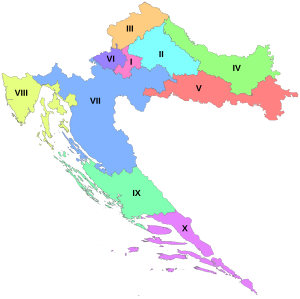
The 151 members of the Croatian Parliament are elected from ten geographical and two special constituencies. [1] 140 seats are elected from ten 14-seat constituencies (1st–10th constituencies) by open list proportional representation using a 5% electoral threshold, with seats allocated using the d'Hondt method. Voters can give their "preference vote" to a single candidate on the list, but only candidates who have received at least 10% of the party's votes take precedence over the other candidates on the list. [2] A further three seats are elected in a special electoral district (11th constituency) for Croatian citizens living abroad
Eight seats are elected from a constituency for national minorities (12th constituency), with three seats for Serbs and one each for Italians, Hungarian, Czechs and Slovaks, Albanians/Bosniaks/Macedonians/Montenegrins/Slovenes and Austrians/Bulgarians/Germans/Jews/Poles/Roma/Romanians/Rusyns/Russians/Turks/Ukrainians/Vlachs. Voters with the right to vote in the 12th constituency can choose to either vote for a candidate list on the ballot in the district they belong to according to their place of residence (one of the ten geographical districts) or for a candidate of their minority in the 12th constituency. [3]
Candidate lists may be proposed independently by one political party or by two or more political parties (coalition list) which are registered in Croatia on the day the decision to call the elections is announced, or by voters. Voters can propose independent candidate lists by collecting 500 signatures of residents of the constituency the list is running in. [4]
Surveys in Croatia are conducted by specialized companies in the field of public opinion polls, and their results are published in cooperation with national television or newspapers. The media that publish the results are listed in the table below according to which TV show they publish the results, with which poll company they cooperate, the size of the poll, the number of polls conducted so far and the time of publication of the results.
| Media | Presentation of the results | Polling firm | Poll size | Conducted polls | Time of publication of polls |
|---|---|---|---|---|---|
| HRT | Dnevnik 2 at 19:00 (CET) | Promocija plus | 1,100-1,400 | 14 | 20th of the month (except in April 2022) |
| RTL | RTL Danas at 18:30 (CET) | 1,300 | 37 | Between 4th and 10th of the month, usually on Sunday | |
| Nova TV | Dnevnik Nove TV at 19:15 (CET) | Ipsos | 976–996 | 39 | Between 23rd and 26th of the month [lower-alpha 4] |
| N1 | N1 Newsroom at 16:00 (CET) | Masmi | 1,300 | 1 | One year after last general elections |
| Večernji list | Internet publication | 2x1 komunikacije | 1,041 | 11 | Between 24th and 30th of the month |
Poll results published by major media are listed in the table below in reverse chronological order, showing the most recent first, and using the date of publication, name of polling firm with a link to the page of results and poll size. The highest percentage figure in each polling survey is displayed in bold, and the background shaded in the leading party's color. In the instance that there is a tie, then all tied parties cells would be shaded. The lead column on the right shows the percentage-point difference between the two parties with the highest figures. When a specific poll does not show a data figure for a party or the support percentage is less than 1.0%, the party's cell corresponding to that poll is shown with a dash. Table also include other elections that are held between two parliamentary elections.
| Publication date | Polling firm | Votes | HDZ | SDP | DP | PiP | Možemo | Most | HS | Fokus | IDS | NPS | RF | Centar | HSS | HSU | HNS | Others | Undecided | Lead |
|---|---|---|---|---|---|---|---|---|---|---|---|---|---|---|---|---|---|---|---|---|
| 2024 European Parliament election in Croatia | ||||||||||||||||||||
| 7 Jun 2024 | Promocija plus | 1,300 | 29.8 | 22.3 | 8.4 | 1.2 | 9.2 | 6.7 | 0.5 | 1.4 | 2.0 | - | 0.8 | 1.0 | 1.0 | 0.6 | 0.7 | - | 10.7 | 7.5 |
| 24 May 2024 | Ipsos | 990 | 30.5 | 20.2 | 7.4 | - | 11.1 | 8.6 | - | - | - | - | - | - | - | - | - | 10.6 [lower-alpha 5] | 11.6 | 10.3 |
| 12 May 2024 | Promocija plus | 1,000 | 29.5 | 23.2 | 8.3 | 1.2 | 9.3 | 5.6 | 0.7 | 1.3 | 1.1 | 1.0 | 1.0 | 1.1 | 1.4 | 1.2 | 0.8 | - | 9.5 | 6.3 |
| 25 Apr 2024 | Ipsos | 1,000 | 28.5 | 22.2 | 10.1 | - | 12.3 | 8.3 | - | - | - | - | - | - | - | - | - | - [lower-alpha 6] | 6.7 | 6.3 |
| 17 Apr 2024 | 2024 Election results | N/A | 34.4 | 25.4 | 9.6 | 9.1 | 8.0 | 2.3 | 2.3 | 1.2 | 0.8 | - [lower-alpha 7] | - [lower-alpha 7] | - [lower-alpha 8] | - [lower-alpha 8] | 6.98 | - | 9.0 | ||
The politics of Croatia are defined by a parliamentary, representative democratic republic framework, where the Prime Minister of Croatia is the head of government in a multi-party system. Executive power is exercised by the Government and the President of Croatia. Legislative power is vested in the Croatian Parliament. The Judiciary is independent of the executive and the legislature. The parliament adopted the current Constitution of Croatia on 22 December 1990 and decided to declare independence from Yugoslavia on 25 May 1991. The Constitutional Decision on the Sovereignty and Independence of the Republic of Croatia came into effect on 8 October 1991. The constitution has since been amended several times. The first modern parties in the country developed in the middle of the 19th century, and their agenda and appeal changed, reflecting major social changes, such as the breakup of Austria-Hungary, the Kingdom of Serbs, Croats and Slovenes, dictatorship and social upheavals in the kingdom, World War II, the establishment of Communist rule and the breakup of the SFR Yugoslavia.

Parliamentary elections to elect all 151 members of the Croatian Parliament were held on 23 November 2003. They were the fifth parliamentary elections to take place since the first multi-party elections in 1990. Voter turnout was 61.7%. The result was a victory for the opposition Croatian Democratic Union (HDZ) which won a plurality of 66 seats, but fell short of the 76 needed to form a government. HDZ chairman Ivo Sanader was named the eighth Prime Minister of Croatia on 23 December 2003, after parliament passed a confidence motion in his government cabinet, with 88 MPs voting in favor, 29 against and 14 abstaining. The ruling coalition going into the elections, consisting of the Social Democratic Party (SDP), Croatian People's Party (HNS), Croatian Peasant Party (HSS), Party of Liberal Democrats (Libra) and the Liberal Party (LS), did not contest the elections as a single bloc; the SDP ran with the Istrian Democratic Assembly (IDS), the Party of Liberal Democrats (Libra) and the Liberal Party, HNS ran with the Alliance of Primorje-Gorski Kotar (PGS) and the Slavonia-Baranja Croatian Party (SBHS), while HSS ran on its own.

The Social Democratic Party of Croatia is a social-democratic political party in Croatia. The SDP is anti-fascist, progressive, and strongly pro-European. The SDP was formed in 1990 as the successor of the League of Communists of Croatia, the Croatian branch of the League of Communists of Yugoslavia, which had governed Croatia within the Socialist Federal Republic of Yugoslavia since World War II.

The Croatian People's Party – Liberal Democrats is a social-liberal political party in Croatia.

Open list describes any variant of party-list proportional representation where voters have at least some influence on the order in which a party's candidates are elected. This is as opposed to closed list, in which party lists are in a predetermined, fixed order by the time of the election and gives the general voter no influence at all on the position of the candidates placed on the party list.

Elections to the European Parliament take place every five years by universal adult suffrage; with more than 400 million people eligible to vote, they are the second largest democratic elections in the world after India's.
Regular elections in Croatia are mandated by the Constitution and legislation enacted by Parliament. The presidency, Parliament, county prefects and assemblies, city and town mayors, and city and municipal councils are all elective offices. Since 1990, seven presidential elections have been held. During the same period, ten parliamentary elections were also held. In addition, there were nine nationwide local elections. Croatia has also held three elections to elect members of the European Parliament following its accession to the EU on 1 July 2013.
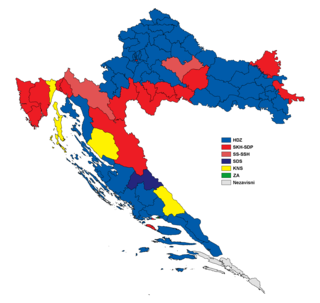
Parliamentary elections were held in the Socialist Republic of Croatia between 22 and 23 April 1990; the second round of voting occurred on 6–7 May. These were the first free, multi-party elections held in Croatia since 1938, and the first such elections for the Croatian Parliament since 1913. Voters elected candidates for 356 seats in the tri-cameral parliament; the turnout in the first round ranged between 76.56% and 84.54% for various parliamentary chambers. In the second round, the turnout was 74.82%. The Croatian Democratic Union (HDZ) won 205 seats, ousted the League of Communists of Croatia – Party of Democratic Reform (SKH-SDP) from power and ended 45 years of communist rule in Croatia. The new parliament convened for the first time on 30 May, elected Franjo Tuđman as President of the Croatian Presidency and soon after renamed the office to President of Croatia.
Parliamentary elections were held in Croatia on 2 August 1992, alongside presidential elections. They were the first elections after independence and under the new constitution. All 138 seats in the Chamber of Representatives were up for election. The result was a victory for the Croatian Democratic Union, which won an absolute majority of 85 seats. Voter turnout was 75.6%.

Parliamentary elections were held in Croatia on 25 November 2007 and for overseas voters on 24 and 25 November. The campaign officially started on 3 November. The President of Croatia announced elections on 17 October and 14 days were allowed for candidate lists to be submitted.

Parliamentary elections were held in Croatia on Sunday, 4 December 2011 to elect 151 members to the Croatian Parliament. They were the sixth parliamentary election in Croatia since independence.
The Croatian Parliament electoral districts are the special territorial subdivision of Croatia used for the country's parliamentary elections.
Opinion polling for the 2011 Croatian parliamentary election started early after the previous election with polls on individual parties. As electoral coalitions were formed, coalition ratings started to be polled as well. The poll results below are listed by category and ordered in reverse chronological order. Major political events are indicated chronologically between individual polls. Concurrent polling was at the time also done for the 2012 Croatian European Union membership referendum.

European Parliament elections were held in Croatia for the first time on 14 April 2013 to elect twelve Members of the European Parliament. The members served the remainder of the Parliament's 2009–2014 term after Croatia entered the European Union on 1 July 2013. The country formed a single constituency, with members elected by proportional representation using open lists.
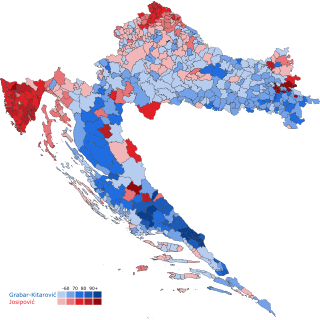
Presidential elections were held in Croatia on 28 December 2014 and 11 January 2015, the sixth such elections since independence in 1991. Only four candidates contested the elections, the lowest number since 1997. Incumbent President Ivo Josipović, who had been elected as the candidate of the Social Democratic Party in 2009–2010 but ran as an independent, was eligible to seek reelection for a second and final five-year term. As no candidate received 50% of the vote in the first round in December 2014, a run-off took place in January 2015 between the two candidates with the most votes; Josipović and Kolinda Grabar-Kitarović. Grabar-Kitarović went on to win the elections by a slim margin of 32,509 votes or 1.48%, making her Croatia's first female president.
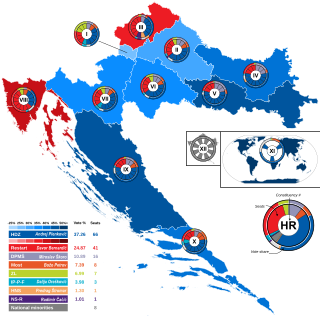
Parliamentary elections were held in Croatia on 5 July 2020. They were the tenth parliamentary elections since the first multi-party elections in 1990 and elected the 151 members of the Croatian Parliament. 140 Members of Parliament were elected from geographical electoral districts in Croatia, three MPs were chosen by the Croatian diaspora and eight MPs came from the ranks of citizens registered as belonging to any of the 22 constitutionally recognized national minorities.

European Parliament elections were held in Croatia on 26 May 2019, electing members of the national Croatia constituency to the European Parliament. These were the third such elections in the country since its accession to the European Union in 2013.
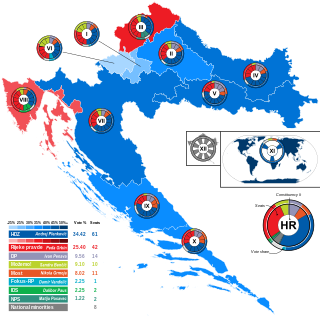
Parliamentary elections were held in Croatia on 17 April 2024 to elect the members of the 11th Sabor. Prior to the elections, the government consisted of a coalition of the Croatian Democratic Union and Independent Democratic Serb Party, with parliamentary support of five national minority MPs, two MPs from the Croatian Social Liberal Party and Croatian Demochristian Party, and one independent MP, Silvano Hrelja.

Elections were held in Zagreb on 16 May 2021 for the 53rd mayor of Zagreb, the two deputy mayors, the 47 members of the Zagreb Assembly, the councils of districts and the local committees, as part of the 2021 Croatian local elections. The runoff for the mayor took place on 30 May 2021.
Electoral district XI is one of twelve electoral districts of Croatian Parliament.